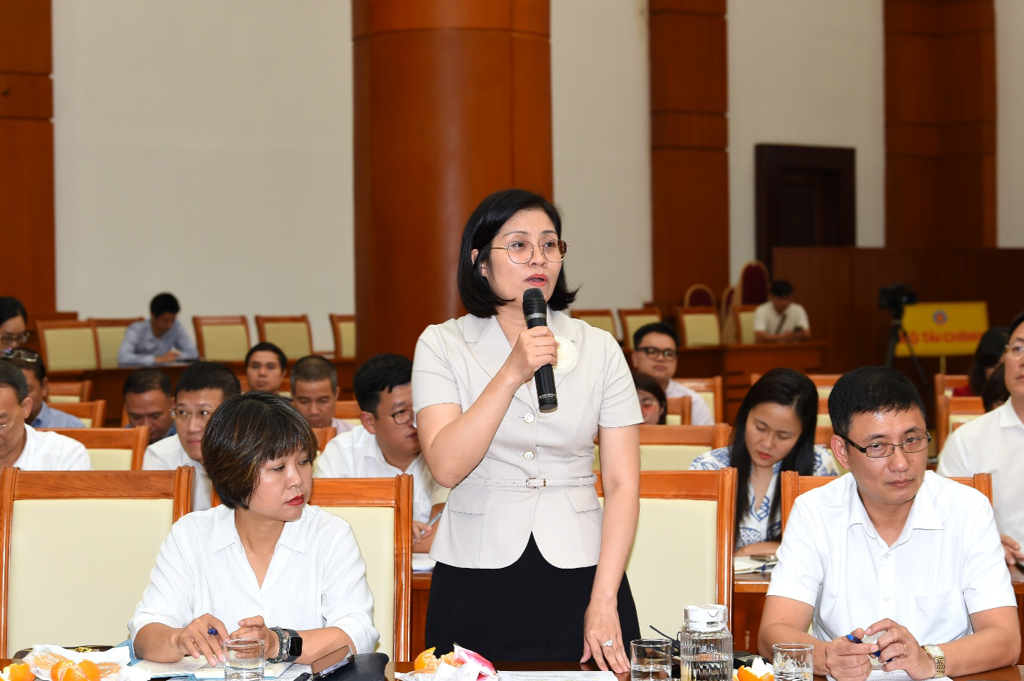 |
| Bui Anh Tuan, director general of APED |
On October 20 in Hanoi, the Agency for Private Enterprise and Collective Economy Development (APED) under the Ministry of Finance, together with the German Development Agency (GIZ), organised a workshop focused on the Vietnam Enterprises Twin Transition Partnership. The event highlighted the dual challenge facing local businesses: embracing digital technologies while greening their operations to meet international sustainability standards.
The Vietnam Enterprises Twin Transition Partnership serves as a strategic platform where the government, development organisations, investment funds, corporations, and startups come together to co-create an ecosystem for Vietnam’s twin transition, towards both digital and green growth.
In his opening remarks at the workshop, Bui Anh Tuan, director general of APED, revealed that there are currently over 1 million enterprises and 5.2 million household businesses in Vietnam, of which 98 per cent are small and medium-sized enterprises (SMEs). This group is considered the core driving force of the national economy.
“APED is committed to closely partnering with organisations such as GIZ through initiatives like the Twin Transition Hub, turning ideas into practical actions that empower the private sector to overcome barriers and seize growth opportunities in the digital era,” said Tuan.
To help businesses keep pace with the twin transition, the Politburo has issued key policies, notably Resolution No.57-NQ/TW on breakthroughs in sci-tech and digital transformation, and Resolution No.68-NQ/TW on the development of the private sector.
These resolutions focus on several core solutions: promoting science, technology, innovation, digital and green transformation, and fostering efficient and sustainable private-sector growth; diversifying and enhancing the effectiveness of public-private partnerships (PPPs); and urgently developing and implementing a scheme to foster 1,000 exemplary enterprises, pioneers in sci-tech, innovation, digital and green transformation, high-tech industries, and supporting industries.
Given that the vast majority of Vietnamese enterprises are SMEs, Jens Schmidt-Kreye, deputy head of Development Cooperation at the German Embassy in Vietnam, stressed that the twin transition is no longer just a trend, it is already happening. For Vietnamese SMEs, this transformation has become a strategic imperative in the country’s process of international economic integration.
“This reflects the strong and long-standing strategic partnership between the two nations, providing a comprehensive overview of the digital and green transformation journeys Vietnamese firms have undertaken in 2024 and early 2025, based on data and surveys from SMEs,” said Schmidt-Kreye.
 |
Introducing the Twin Transition Hub, a public-private cooperation model aimed at helping enterprises boost efficiency and cut emissions, Bui Thanh Minh, deputy director of the Office of the Private Economic Development Research Board, said the twin transition is a necessary step for businesses to remain competitive and sustainable.
“This imperative is being driven by multiple factors. Vietnam has set an ambitious target of double-digit economic growth for the 2026–2030 period, and to achieve it, there is no alternative but to accelerate digital and green transformation to boost productivity and labour quality,” he said.
Another key driver is market pressure arising from mechanisms such as the EU’s Carbon Border Adjustment Mechanism and increasing green product requirements from major markets like China and Japan.
“In addition, Vietnam has committed to achieving net-zero emissions by 2050. To reach this target, the twin transition – focused on cutting greenhouse gas emissions and addressing the impacts of climate change and environmental pollution – has become essential,” Minh said, proposing several collaborative models involving social enterprises, public service units, and the PPP model.
Nguyen Huong Quynh, CEO of BambuUP, outlined a roadmap for AI adoption that begins with assessing current status and goals, standardising data and infrastructure, piloting simple yet impactful AI applications, fostering a culture of leadership and innovation, and finally measuring, optimising, and scaling up.
Building on this, Nguyen Huu Hieu, CEO of FiinGroup, stressed the need for fast but sustainable growth. His report identifies 35 potential service providers divided into three categories: leaders, emerging players, and niche operators.
“These three groups together form a complementary ecosystem,” Hieu said. “Leaders pave the way, emerging firms accelerate diffusion, and niche companies enhance specialised solutions, collectively laying the foundation for an effective twin transition in Vietnam.”
 |
| Signing ceremony between APED and partner organisations at the Vietnam Enterprises Twin Transition Partnership workshop |
A key highlight of the event was the signing of strategic cooperation agreements designed to mobilise additional resources for enterprises. Under these agreements, APED committed to supporting businesses and partners in implementing twin transition initiatives, with a particular focus on SMEs.
As part of the conference, an in-depth discussion session brought together policymakers, major corporations, and startups, fostering a dialogue that integrated diverse perspectives into shared solutions.
Participants expressed confidence that, with technical support from the German government, implementation by GIZ, active involvement from tech companies, banks, and financial institutions, and strong backing from APED under the Ministry of Finance, Vietnam’s private sector will soon align with global trends in digitalisation, sustainable development, and international integration, contributing effectively to the objectives set out in Resolution No.68-NQ/TW.
 |
Vietnam’s startup momentum strengthens under new policy push
Vietnam’s startup scene is gaining fresh momentum, with new and returning businesses surging amid stronger policy support for the private sector, according to the Ministry of Finance (MoF). |
 |
VYEA drives CEO training initiative following VPSF 2025
The Vietnam Young Entrepreneurs Association (VYEA) is turning high-level recommendations from Vietnam Private Sector Forum 2025 into concrete action, aiming to equip the next generation of business leaders for Vietnam’s integrated economy. |
 |
Vietnamese Women Entrepreneurs Forum spotlights female leadership
The Vietnamese Women Entrepreneurs Forum convened in Hanoi, bringing together leaders and businesswomen from across the country to advance the role of women in Vietnam’s private sector. |





